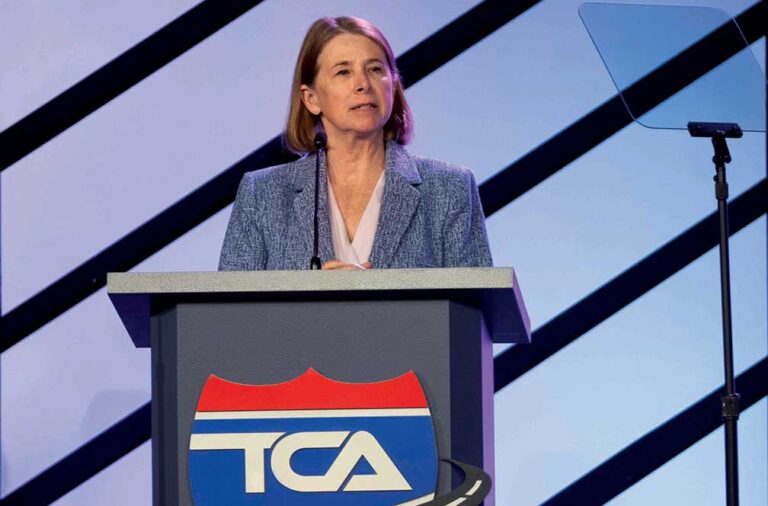If truck drivers are safe at work, the nation’s roadways will be safer, according to Federal Motor Carrier Safety Administration (FMCSA) Acting Deputy Administrator Sue Lawless.
This observation was made Monday, March 26, during the Truckload Carriers Association’s (TCA) annual convention in Nashville. Lawless was addressing attendees during a luncheon and awards ceremony honoring members of TCA’s Champions Club, winners of the Past Chairmen’s and Chairman’s Choice awards, and TCA’s Highway Angels of the Year for 2024-25.
During her speech, she touched on several topics, including truck parking, the importance of female truck drivers, and workplace safety. She also complimented the industry and its stakeholders, many of whom were gathered to hear her speak.
“You are among the best of the best of safe trucking,” she said. “Every day, you show us what motor carriers can do to keep the country moving, and you do it safely.”
Lawless said the FMCSA and its partners are continually working toward the goal of zero fatalities on the nation’s roadways through programs such as the National Roadway Safety Strategy.
“Zero is an ambitious goal, but we believe it is the only acceptable number,” Lawless said. “Somebody told me … that we will never get to zero — that it’s impossible to get to zero. I disagree.”
Lawless noted she is not naive to the fact that the goal will be difficult to attain, adding, “Just because you can’t see something now, it doesn’t mean that it could not exist in the future.”
Lawless ticked off a list of things she believes can help move the nation toward zero highway deaths — advances in technology to assist drivers, improvements in equipment, improvements in emergency response, and availability of medical treatment.
“All of those things have the potential to make zero deaths a reality in our lifetime, and that’s why partnerships with organizations like TCA, safety advocates, state and local governments, and others are so critical in our mission,” she said.
In March, the U.S. Department of Transportation released a progress report on the National Roadway Safety Strategy. Although strides are being made toward safer highways, Lawless said that the “number of deaths remains unacceptably and stubbornly high.”
U.S. traffic deaths fell 3.6% last year, but still, almost 41,000 people were killed on the nation’s roadways, according to full-year estimates by safety regulators. The National Highway Traffic Safety Administration said it was the second year in a row that fatalities decreased.
“We know that we must do more, and we know that we can’t do it alone,” Lawless said. “It’s great to see over 160 organizations answer the department’s call to action campaign, and we thank TCA for being one of the first partners to answer our call.”
Turning to truck parking, Lawless said progress has been made since the Bipartisan Infrastructure Law provided millions in federal grant funding to help states add hundreds of truck parking spaces.
“Those projects included $180 million to the Florida Department of Transportation for over 900 truck parking spaces, over $92 million to the Missouri Department of Transportation for a project that includes both truck parking and truck parking information systems, and over $22 million to Tennessee for a bridge replacement and additional truck parking,” Lawless noted.
Lawless also pointed out that the FMCSA has additional research projects to help advance truck parking availability information systems. The agency is also analyzing available data on safety from connected trucks to help identify areas with the highest demand and need for parking and how to best target solutions, resources, and methodologies for stakeholders to calculate the cost and benefit of investing in parking.
“We know truck parking remains a safety and overall quality of life issue for drivers, and it remains a priority for us to partner across the industry to help ease and eventually eliminate this challenge,” she said. “We have also launched our driver compensation and driver detention time studies to address other factors that may make it difficult to sustain a career as a truck driver. We know that the longer drivers stay in the industry, the safer they become.”
Switching topics, Lawless discussed the March meeting of the Truck Leasing Task Force during the Mid-America Trucking Show, held the week before TCA’s convention. The task force includes motor carriers, drivers, and others who are engaged in helping the FMCSA understand how unfair leasing arrangements could impact the safety of drivers and motor carriers.
Lawless also spoke about how the FMCSA is working to modernize its systems in a world in which cybersecurity is paramount.
“FMCSA (has a) new registration system (that) will improve the transparency, efficiency, and user experience with the agency’s registration systems and reduce fraud in the registration process,” she said. “This is just one of the steps we’re taking to modernize all FMCSA systems.”
On the rulemaking side, Lawless said the FMCSA is working to get the heavy-duty automatic emergency braking rule “over the finish line” and complete other rulemakings.
“Because we believe that technology has the promise of saving lives, we continue to look for ways to encourage the adoption of technology that can prevent crashes or reduce the impact from crashes that happen, including beyond-compliance initiatives and other ways to encourage carriers and drivers to use technology that improve safety, but most importantly makes sense for them,” Lawless said.
Lawless said the FMCSA realizes that distracted driving of all kinds, along with speed and drug and alcohol use, remain “stubborn and persistent” causal factors in crashes.
In closing, she noted that the FMCSA is continuing to seek ways to get the greatest impact from its grant programs to help the trucking industry grow and prosper.
“Earlier this month, we announced our notes of funding opportunities for 2024,” she said. “We have more than $180 million available, including opportunities for CDL and other driver training and programs specifically for veterans who want to become truck drivers. I hope that this has given you some insight into our work at FMCSA. I’m proud of our work/ I’m encouraged by our partnership.”
This article originally appeared in the May/June 2024 edition of Truckload Authority, the official publication of the Truckload Carriers Association.
Born in Pine Bluff, Arkansas, and raised in East Texas, John Worthen returned to his home state to attend college in 1998 and decided to make his life in The Natural State. Worthen is a 20-year veteran of the journalism industry and has covered just about every topic there is. He has a passion for writing and telling stories. He has worked as a beat reporter and bureau chief for a statewide newspaper and as managing editor of a regional newspaper in Arkansas. Additionally, Worthen has been a prolific freelance journalist for two decades, and has been published in several travel magazines and on travel websites.















That’s a perfect name for someone who hates truckers. Time for a braincheck, Ms. Lawless. It is not the trucker who is weaving in and out of traffic. It is not the trucker who cause 90% of the vehicle accidents. It is not the trucker who is traveling 100+mph in 55mph zone. Ms. Lawless, why don’t request the states impose your hypocrisy on the car drivers?
why don’t you spend a day sitting in the jump seat of a truck? you will quickly see its all these youngsters new drivers driving down the road with their foot on the dash tablets on the dash watching movies while driving. all these electronics in a truck is a distraction. and let’s not forget the aggressive driving of all the foreigners that are being put behind the wheel. you people who have never seen the inside of a cab or spent a day in a semi are on the wrong path for safety. and don’t forget the cars that cut us off . lady just spend one day riding up and down the highway in a semi, you will end your day with a whole different outlook. and then there is the eld that causes a driver to race the click to get to a safe place. re-evaluate. you have no ideal!
Zero fatalities is not a realistic number by any stretch of your imagination. I understand safety, but to what extreme?
this lady is a complete idiot with no realistic approach to truck safety. The truckers drive safer than 95 percent of all the traffic on the road. we need someone in that seat that actually understands and knows something about trucking. Not this dumbass that’s trying to blame the people who are the safest. Get rid of this complete degenerate and replace her with someone who actually knows.